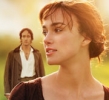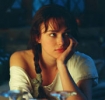Pride & Prejudice
Close your eyes,1 and journey back with me through time to the simpler, happier time of 1995. When men were men, women were… well, I don’t know, I was fourteen… and the ABC’s 7:30pm slot on Sundays was the best TV of the week. It had started with Hamish Macbeth, and the local show SeaChange would carry the baton later. But for six glorious weeks, the BBC’s adaptation of Jane Austen’s Pride & Prejudice2 was compulsory viewing.3 It was funny, clever, romantic and beautiful.
Alright, we can come back now. Suddenly, I hear that someone in Britain wants to make a film out of the book. All around the world, people say “But they just made that perfect miniseries!” before then realising: “Oh, that was almost ten years ago. I’m getting old.” Still, there’s a lot of pressure. The BBC Pride & Prejudice launched ‘Darcymania’4 and got Colin Firth’s film career going. It inspired Bridget Jones’ Diary, which used Firth as Darcy as well. This miniseries created ripples still felt today. So what’s the point of making it into a film now?
Well, as it turns out, film and TV are pretty different things. This Pride & Prejudice is awesome too, and much of that is because of it’s medium. And some of it is because of Keira Knightley. And some of it is the deftly compressed screenplay. And some of it is because of Rosamund Pike. Actually, there’s plenty of awesomeness to go around.
Pride & Prejudice is up there with The Fellowship of the Ring as one of the greatest book to film adaptations I’ve seen. I judge this only by a rough balance of the “Where’d it go” factor, coupled with the “clever and new” factor. The “Where’d it go” business is when you’re watching the film, and you’re expecting one of the good bits to come up, consciously or subconsciously, and then it very obviously doesn’t, and you get grumpy. The worst adaptation I’ve seen in this regard was the recent Hitchhiker’s Guide to the Galaxy.5 There was almost none of this in the film, I’m happy to say.6 There’s also the much trickier aspect, where they try to add new stuff to a book that has comfortably resided near the top of the English Literary Canon for ages. This can provoke critics to call the screenwriter a “meddling hack” or somesuch nastiness. Deborah Moggach is not one of these: the additions were all splendid, and often hilarious.
The lovely romantic plot of the novel is still intact, too. They present the simmering attraction between Darcy and Elizabeth a little more strongly in places than I was expecting, but then, I was used to an adaptation that had six episodes to build up the tension with. The film is quite focussed on reminding the audience exactly what sort of social situation existed at the time: women had to find a man, preferably before twenty-eight or so, or be left on the shelf as a financial burden (and disappointment) to their family. This is a bit sad, but on the bright side, if you were born a rich male landowner, your life rocked. You got to wander round England, doing not much of anything, in cool jackets and not-so-cool tight pants, and when you got tired you could retreat to your massive stately home and wander through your art collection, perhaps even stopping to admire the bust you had made of your amazing good looks. Anyhow, this film expresses both aspects nicely.
There’s also an interesting focus on the servants. While almost none of them even get to talk, the camera follows them often, either from scene to scene, or just lingering on them occasionally as they go about their business. It’s another nice, and probably important, touch that highlights for a modern audience just how different this society is from our own: it becomes quite shocking when almost none of the characters ever says “thank you” to them, or even recognises their existence.
The dancing was another big part of life. Just like now, you went there to meet people of the opposite sex; unlike now, you had to bring your family with you. Ugh. The film captures the balls brilliantly, with frenetic camerawork that shifts its focus from character to character, but not so fast that you feel woozy. The direction is quite impressive the whole way through, really — there’s some really beautiful frames along the way, though on occasion they’re spoiled by some over-cheesy crescendos in the score.
Oh, dammit all, I can’t go any further without mentioning Keira. She’s so cute, even my girlfriend thinks she’s hot.7 She doesn’t quite fill out those regency dresses as well as Jennifer Ehle did, but she does do an awesome ‘repressed-passion-stare’ and the most adorable laugh you ever did see. Rosamund Pike (Die Another Day) is also really cute, and manages to do wide-eyed innocence without looking stupid, which I presume is reasonably difficult. On the other side of things, Matthew MacFadyen had big shoes to fill as Darcy, but does quite nicely through being quite different — a younger, less confident Darcy, which makes for some excellent jokes. On occasion his delivery seems a little awkward, but it was hard to tell if that was him acting awkward or just being awkward, so I should probably give him the benefit of the doubt. Donald Sutherland landed the plum role of Mr Bennett, who has all the best lines in the book. While some of them didn’t make it to the film, he still provides a wonderful performance, with a lot more vulnerability than I expected. This review will go on far too long if I mention all of the cast, but there were no weak spots, save the not-quite-charismatic-enough Wickham. Wickham’s got to be everything Darcy isn’t, but this one only managed to be wooden.
So, the new Pride & Prejudice was worth making. It’s characters are more vulnerable and passionate, and it’s world is more messy and real — most of the actors aren’t wearing make-up; I’d say all of them weren’t but as I’ve mentioned, Keira and Rosamund looked pretty hot and I don’t want to seem naïve. But it’s still the same classic story, with joy, scandal, bitchiness, humour, one or two ridiculous coincidences, and true love.
Oh, and pride, and prejudice.8
- Promise not to run you through with a sword. ↩
- Not to be confused with the probably quite excellent 1990 thriller film Pride and Extreme Prejudice. ↩
- But usually, only for girls. What can I say? I really like period dramas, and romantic comedies, and Austen is a great mix of the two. And yes, I’m a big pansy. ↩
- It’s like Dalekmania but with less exterminating and more sighing. ↩
- Damn, that film was irritating if you’d read the book.
“The plans were on display.”
“You hadn’t really gone out of your way to let people know, had you?”
“You found them, didn’t you?”
“Yes, they were… in a cupboard.”
Aaaaargh! Where’s my fucking leopard? Excuse me. I never wrote a review for that one and I’ve been holding this back for ages. Where was I? Ah yes, do the honours, little arrow link. ↩ - Once you get over a whole character being (very sensibly) removed. ↩
- I asked the obvious question, but no dice. ↩
- Yuk yuk. Sorry. Finishing a review is tricky sometimes and I’m out of practice. ↩



Andy
November 13th, 2005 at 6:09 am
I don’t think you could convince Keira to participate so don’t feel too down about it.
Sure things would be good for a bachelor land owner with girls like Keira actively hunting husbands but I thought the girls wre supposed to be more homely. At least they didn’t sound hot in the paragraph I read of the novel PaP before I fell asleep.
Tom
November 13th, 2005 at 12:08 pm
You don’t know that.
Society’s perception of women changes all the time. What seemed homely to people in that time might be what we in the twenty-first century think of as hot hot hot. But I just meant hot in the sense of “really pretty and attractive”. It’s mentioned clearly in the text that the two eldest sisters, Jane and Elizabeth, are very pretty.
Andy
November 13th, 2005 at 10:30 pm
I don’t know that. Maybe if there was alcohol involved …
Do people use the acronym PaP much?
Tom
November 14th, 2005 at 12:12 am
I think P&P is much more likely.